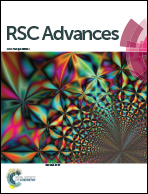Enhanced biological performance on nano-microstructured surfaces assembled by SrTiO3 cubic nanocrystals
Abstract
Controlling protein adsorption on material surfaces can offer significant opportunities in terms of engineering the material–cell interactions. In this work, SrTiO3 cubic nanocrystals exposed with {100} facets, which was proved to have strong protein affinity previously, were used to assemble nano-microstructured surface. We demonstrated that the nano-microstructured surface with highly stacking density of the nanocrystals had enhanced cellular responses in cellular adhesion and proliferation compared to that of the (100)-terminated SrTiO3 single crystal substrate. The enhancement is attributed to more interaction sites resulting from heavy protein adsorption on {100} facets of the SrTiO3 cubic nanocrystals, and more appropriate cell growth microenvironment arising from the nanocrystals stacked nano-microstructure. The two factors are suggested to play critical role in material–cell interactions. The SrTiO3 cubic nanocrystals are powerful units to assemble surface nano/microstructure with highly biological responses.


 Please wait while we load your content...
Please wait while we load your content...